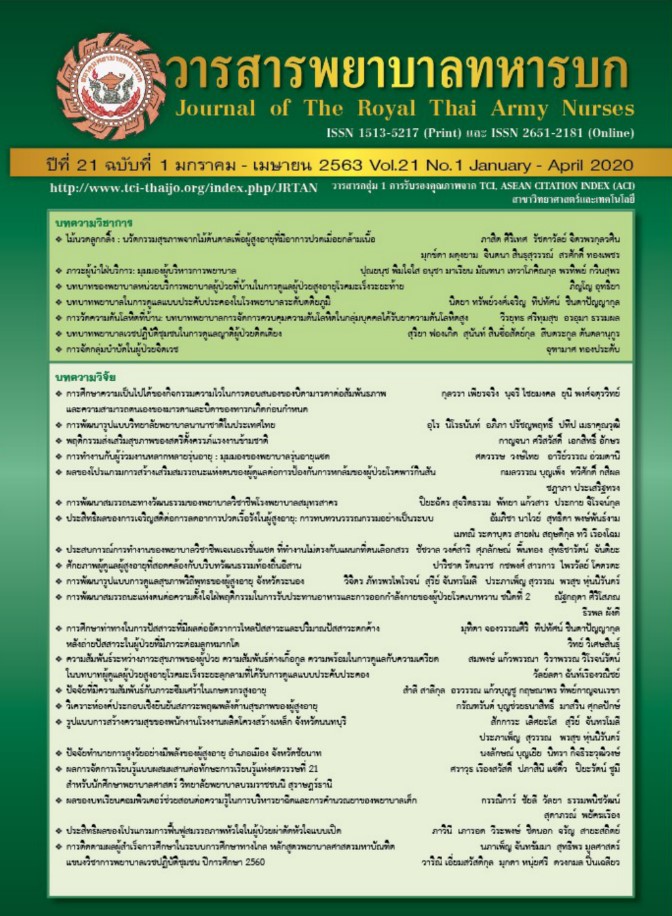The effects of Self-efficacy Enhancement on Blood Pressure Level Controlled among Hypertension Risk Group
Keywords:
Hypertension risk group, Blood pressure, Self-efficacyAbstract
The objective of this quasi-experimental research was to compare the perception of self-efficacy, the expected outcomes of the self practice and self practice behavior on blood pressure level controlled in hypertension risk group. The purposive sample were using the power of a test included and were assigned into experimental group and the control group 30 persons in each groups, The research instrument consisted of a perceived self-efficacy questionnaire, Self-efficacy Enhancement program and self-care handbook. Data were analyzed using descriptive statistic paired t-test, Independent t-test.
The study revealed that after the intervention, the experiment group had perception of self-efficacy, the expected outcomes of the self practice and self practice behavior for salt eating and sodium salt, exercise and emotional management had a significantly higher average score than the control group at .05. The blood pressure level of the experimental group decreased with a significantly higher than the control group at 0.05.
Downloads
References
Alsarah, A., Alsara , O., & Bachauwa. (2019). Hypertension Management in the Elderly: What is the Optimal Target Blood Pressure? Heart views, 2019; 16 (1): 11-16.
Poulter NR, Prabhakaran D, Caulfield M. Seminars in Hypertension. Lancet. 2015, 386:801–812.
Mehta, S., Cameron, K. &Battistella, M. Motivational interviewing: Application to end stage renal disease patients. Canadian Association of Nephrology Nurses and Technologists Journal, 2014, 24(4):19-24.
Dechkong, T., Motivational Interviewing for NCDs; MI NCDs . (Bangkok) Beyond Publishing Co., Ltd. 2017. (In Thai).
Wiriyapongsukit, S., Mangjit, P. &Namthussanee, S. District Health System. (2ns ed.). Nonthaburi: The Agricultural Cooperative Federation of Thailand.Limited. 2013. (In Thai)
Munnaiboontham, W. Thai Health Promotion in Thailand 4.0. Journal of Public Health, Khon Kaen. 2016; 28(2): 4-7. (in Thai).
Kulaphanich, M., Supavititpatana, B., & Chaloumsuk, N. Effect of Self-effiacy Enhancement on Breastfeeding Among Adolescent Mothers. Nursing Journal. 2019; 46 (2): 36-46. (in Thai).
Chowchalard, P., Benjakul, S., Kengganpanich, M., & Kengganpanich, S. Effectsofan Alcohol UsePreventionProgram ApplyingSelfEfficacy Theoryamong 7th GradeStudents in NakhonPathom Province. Rama Nurse Journal. 2017; 24 (2): 210-224. (in Thai).
Turongruang, S., Wattana, C., Harnirattisai, T., & iangchawengwor, S. Effects of a Self-efficacy Promoting Program on Disease Control Behaviors and Disease Control among Patients with Uncontrolled Hypertension. Nursing Journal. 2017; 44 (1): 69-82. (in Thai).
Buasom, P., Promsiripaiboon, Y., & Sonkasetrin, A. Effects of Self - Efficacy Program on health behavior modification in elderly of high blood pressure risk group in Rommanee Sub-District, Kapong Distric, Phangnga Province. Community health development quarterly Khon Kean university. 2017; 5(4): 549-567. (in Thai).
Bandura, A. Cultivate self-efficacy for personal and organizational effectiveness. In E. A. Locke (Ed.). Handbook of principles of organization behavior. Oxford, UK: Blackwell. 2009; 179-200
Polit, D. F., Beck, C. T. Nursing research principle and methods (7th ed.). Philadelphia: Lippincott Williams & Wilkins. 2004.
Srisathitnarakur, B. Research methods in nursing science. 5th edition, Bangkok: U&I InterMedia. 2010. (In Thai)
Wutthitham , N., Srinopkun, P., & Srinual, C. The Development of Pattern of Behavioral Health Modification Among Hypertension Group by Family Participation :Damnoen Saduak Hospital in Ratchburi Province. Nursing Journal. 2019; 46(2): 70-82. (In Thai)
Kühlmann, A.Y. et al. Systematic review and meta-analysis of music interventions in hypertension treatment: a quest for answers. BioMed Central Cardiovascular Disorders. 2016; 16:69.
Ulittaphon, P. Using health behavior modification Program for patients on framework of the health belief model and the theory self-efficacy with type 2 diabetes patients at Phanom hospital, Phanom district, Krabi province. Community health development quarterly Khon Kean university. 2015; 3 (3): 442-452. (In Thai)
Saminpanya, P., Toomsan, A., Makornkan, S., & Intachai, P. Perceived Self-Efficacy, Outcome Expectations and Self-Care Behavior of Hypertension Patients Treated at Langkao and Saonoi Subdistrict Health Promotion Hospitals, Muak Lek District, Saraburi Province, Thailand. Human Behavior, Development and Society,2018; 19: 75-83. (In Thai).
Harvie M., &Howell, A., (2017). Potential Benefits and Harms of Intermittent Energy Restriction and Intermittent Fasting Amongst Obese, Overweight and Normal Weight Subjects-A Narrative Review of Human and Animal Evidence. Behavior Sciences. 2017; 7(1): 4.
Poosalee, J., & Preechawong,S., Effects of Health Promoting Program With Thai Boxing Aerobic Dance on Blood Pressure and Body Mass Index of Persons With Pre-hypertension. Journal of The Royal Thai Army Nurses. 2014; 16(1): 218-225. (In Thai).
Sirirat, N., & Kaewsom, K. The Developed Health Education ProgramApplying Self-care Theory in Hypertension. Journal of The Royal Thai Army Nurses. 2019; 20 (1): 331-338. (In Thai).
Department of Health Service Support, Ministry of Public Health. Family volunteer book. Non-communicable disease. 2017. Nonthaburi. The agriculture cooperative federal of Thailand. (In Thai).
Downloads
Published
How to Cite
Issue
Section
License
บทความหรือข้อคิดเห็นใดใดที่ปรากฏในวารสารพยาบาลทหารบกเป็นวรรณกรรมของผู้เขียน ซึ่งบรรณาธิการหรือสมาคมพยาบาลทหารบก ไม่จำเป็นต้องเห็นด้วย
บทความที่ได้รับการตีพิมพ์เป็นลิขสิทธิ์ของวารสารพยาบาลทหารบก
The ideas and opinions expressed in the Journal of The Royal Thai Army Nurses are those of the authors and not necessarily those
of the editor or Royal Thai Army Nurses Association.






